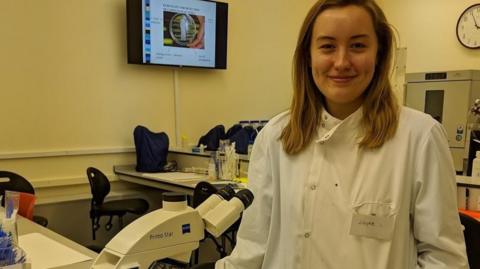She is one of hundreds of newly qualified medical students who have not been found a specific job by the NHS yet.
Instead they have a so-called "placeholder job", meaning they have only been told the rough part of the country they will be in.
Without knowing where they will be living, they say they are not able to start preparations for moving.
It is the second year a new system has been used to allocate foundation jobs for doctors.
Previously, students were ranked and jobs were allocated based on merit, but this was changed for fear it was stressful for students and particularly unfair on those from deprived backgrounds and ethnic minorities.
They tended to perform less well, and therefore were more likely to be posted to regions they did not favour, according to the UK Foundation Programme.
Instead, jobs are assigned randomly, which means a higher proportion of students are not getting what they asked for.
There has also been an increase in the number of medical students applying for jobs after the government opened several new medical schools.

